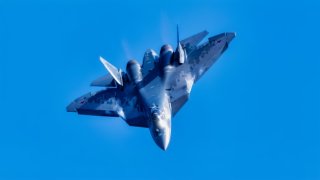Russia’s Su-57 Continues Proving Itself
Russia’s Su-57 will never match the F-22 or F-35 Lightning II. But it doesn’t have to. The plane only needs to be good enough for Russia to remain competitive with the Americans.
The United States has invested hundreds of billions of tax dollars over the last several decades into developing its stealth technology capabilities. As a result, it has a variety of capabilities that, until recently, no other nation possessed.
By 2017, though, things began changing. China announced its first stealth warplane, the fifth-generation Chengdu J-20 “Mighty Dragon.” Meanwhile, the Russians, refusing to be left behind in this race for fifth-generation warplanes, have long been working on their Su-57 “Felon” bird.
Between the three nations, most experts believe the Su-57 is the weakest example of a fifth-generation plane, being surpassed by the aforementioned Chinese J-20 and the American F-22A Raptor and F-35 Lightning II.
Moscow dreamed of making their Su-57 an exportable product. It was to be something to boost the sales of Russia’s leading economic sector, the defense industry. Yet, until earlier this month, the Su-57 languished without any foreign orders. What’s more, Russia could not mass produce a sufficient number of these expensive and complex systems because they had made the Su-57 dependent on a variety of Western technological components.
Contrary to what some in the West would have you believe; Russia did this not because they could not create an indigenous bird. Instead, as part of Moscow’s push to make the Su-57 a foreign export, they wanted to make the plane with components that were more readily available on the world market, thereby increasing the appeal of the plane to foreign purchasers.
Don’t underestimate this bird
By making the Su-57 dependent on Western tech components, though, Russia unwittingly exposed the Su-57 program to being the victim of Western sanctions over Russia’s invasion of Ukraine.
Plus, the fact that the Russians hesitated in deploying the Su-57 into the heaviest fighting in Ukraine led many potential foreign buyers to believe the Russians were overhyping the plane. The real reason the Russians were keeping their Su-57 force in reserve, though, was because the planes were expensive and, should they have been lost in combat, it would have been an imposition on Russia’s defense industrial base to try to replace them quickly.
Besides, the Russians are holding their fine against NATO-backed Ukraine with older, cheaper, simpler Soviet-era systems.
Of course, the Russians have deployed the Su-57 into combat. But they have not given it anywhere the kind of responsibility that many foreign observers assumed it would have been given.
Still, the Su-57 has performed well in combat, notably in conducting strikes from just over the horizon, where Ukraine’s NATO-provided air defense systems cannot threaten the Su-57.
An affordable fifth-generation plane
Interestingly, one of the biggest knocks against the Su-57 by Western observers, that there aren’t enough of these systems for them to be of any real use to Russia, is the one thing that the editorial staff over at the trade publication, Military Watch Magazine, says is the warplane’s greatest advantage. That is its availability costs are lower than the more numerous fleets of American F-22s or F-35s. Because the Su-57’s operational costs are so much lower than those of the American fifth-generation warplanes, it is the far more effective plane for Russia.
More importantly, at the recent Zhuhai Air Show in Guangdong, China, the Su-57 was greeted with snickers and mockery by even the Chinese observers of the plane when it arrived at the airshow. But all the mockery evaporated and was replaced by accolades as the Su-57 put on its most impressive demonstration yet. The Su-57 performed so well that Russia finally received purchase orders from foreign buyers.
Russia’s Su-57 will never match the F-22 or F-35 Lightning II. But it doesn’t have to. The plane only needs to be good enough for Russia to remain competitive with the Americans. Which, of course, the Su-57 is more than competitive with the Americans.
Don’t listen to the naysayers. Russia has a real game-changing system in the Su-57.
Brandon J. Weichert, a National Interest national security analyst, is a former Congressional staffer and geopolitical analyst who is a contributor at The Washington Times, the Asia Times, and The-Pipeline. He is the author of Winning Space: How America Remains a Superpower, Biohacked: China’s Race to Control Life, and The Shadow War: Iran’s Quest for Supremacy. His next book, A Disaster of Our Own Making: How the West Lost Ukraine, is available for purchase wherever books are sold. Weichert can be followed via Twitter @WeTheBrandon.
Image Credit: Creative Commons and/or Shutterstock.

